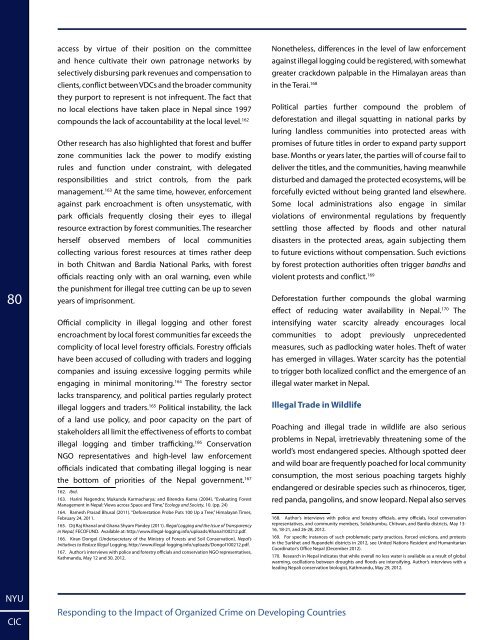here - Center on International Cooperation - New York University
here - Center on International Cooperation - New York University
here - Center on International Cooperation - New York University
You also want an ePaper? Increase the reach of your titles
YUMPU automatically turns print PDFs into web optimized ePapers that Google loves.
80<br />
access by virtue of their positi<strong>on</strong> <strong>on</strong> the committee<br />
and hence cultivate their own patr<strong>on</strong>age networks by<br />
selectively disbursing park revenues and compensati<strong>on</strong> to<br />
clients, c<strong>on</strong>flict between VDCs and the broader community<br />
they purport to represent is not infrequent. The fact that<br />
no local electi<strong>on</strong>s have taken place in Nepal since 1997<br />
compounds the lack of accountability at the local level. 162<br />
Other research has also highlighted that forest and buffer<br />
z<strong>on</strong>e communities lack the power to modify existing<br />
rules and functi<strong>on</strong> under c<strong>on</strong>straint, with delegated<br />
resp<strong>on</strong>sibilities and strict c<strong>on</strong>trols, from the park<br />
management. 163 At the same time, however, enforcement<br />
against park encroachment is often unsystematic, with<br />
park officials frequently closing their eyes to illegal<br />
resource extracti<strong>on</strong> by forest communities. The researcher<br />
herself observed members of local communities<br />
collecting various forest resources at times rather deep<br />
in both Chitwan and Bardia Nati<strong>on</strong>al Parks, with forest<br />
officials reacting <strong>on</strong>ly with an oral warning, even while<br />
the punishment for illegal tree cutting can be up to seven<br />
years of impris<strong>on</strong>ment.<br />
Official complicity in illegal logging and other forest<br />
encroachment by local forest communities far exceeds the<br />
complicity of local level forestry officials. Forestry officials<br />
have been accused of colluding with traders and logging<br />
companies and issuing excessive logging permits while<br />
engaging in minimal m<strong>on</strong>itoring. 164 The forestry sector<br />
lacks transparency, and political parties regularly protect<br />
illegal loggers and traders. 165 Political instability, the lack<br />
of a land use policy, and poor capacity <strong>on</strong> the part of<br />
stakeholders all limit the effectiveness of efforts to combat<br />
illegal logging and timber trafficking. 166 C<strong>on</strong>servati<strong>on</strong><br />
NGO representatives and high-level law enforcement<br />
officials indicated that combating illegal logging is near<br />
the bottom of priorities of the Nepal government. 167<br />
162. Ibid.<br />
163. Harini Nagendra; Mukunda Karmacharya; and Birendra Karna (2004). “Evaluating Forest<br />
Management in Nepal: Views across Space and Time,” Ecology and Society, 10. (pp. 24)<br />
164. Ramesh Prasad Bhusal (2011). “Deforestati<strong>on</strong> Probe Puts 100 Up a Tree,” Himalayan Times,<br />
February 24, 2011.<br />
165. Dij Raj Khanal and Ghana Shyam Pandey (2011). Illegal Logging and the Issue of Transparency<br />
in Nepal, FECOFUND. Available at: http://www.illegal-logging.info/uploads/Khanal100212.pdf.<br />
166. Kiran D<strong>on</strong>gol (Undersecretary of the Ministry of Forests and Soil C<strong>on</strong>servati<strong>on</strong>). Nepal’s<br />
Initiatives to Reduce Illegal Logging, http://www.illegal-logging.info/uploads/D<strong>on</strong>gol100212.pdf.<br />
167. Author’s interviews with police and forestry officials and c<strong>on</strong>servati<strong>on</strong> NGO representatives,<br />
Kathmandu, May 12 and 30, 2012.<br />
N<strong>on</strong>etheless, differences in the level of law enforcement<br />
against illegal logging could be registered, with somewhat<br />
greater crackdown palpable in the Himalayan areas than<br />
in the Terai. 168<br />
Political parties further compound the problem of<br />
deforestati<strong>on</strong> and illegal squatting in nati<strong>on</strong>al parks by<br />
luring landless communities into protected areas with<br />
promises of future titles in order to expand party support<br />
base. M<strong>on</strong>ths or years later, the parties will of course fail to<br />
deliver the titles, and the communities, having meanwhile<br />
disturbed and damaged the protected ecosystems, will be<br />
forcefully evicted without being granted land elsew<str<strong>on</strong>g>here</str<strong>on</strong>g>.<br />
Some local administrati<strong>on</strong>s also engage in similar<br />
violati<strong>on</strong>s of envir<strong>on</strong>mental regulati<strong>on</strong>s by frequently<br />
settling those affected by floods and other natural<br />
disasters in the protected areas, again subjecting them<br />
to future evicti<strong>on</strong>s without compensati<strong>on</strong>. Such evicti<strong>on</strong>s<br />
by forest protecti<strong>on</strong> authorities often trigger bandhs and<br />
violent protests and c<strong>on</strong>flict. 169<br />
Deforestati<strong>on</strong> further compounds the global warming<br />
effect of reducing water availability in Nepal. 170 The<br />
intensifying water scarcity already encourages local<br />
communities to adopt previously unprecedented<br />
measures, such as padlocking water holes. Theft of water<br />
has emerged in villages. Water scarcity has the potential<br />
to trigger both localized c<strong>on</strong>flict and the emergence of an<br />
illegal water market in Nepal.<br />
Illegal Trade in Wildlife<br />
Poaching and illegal trade in wildlife are also serious<br />
problems in Nepal, irretrievably threatening some of the<br />
world’s most endangered species. Although spotted deer<br />
and wild boar are frequently poached for local community<br />
c<strong>on</strong>sumpti<strong>on</strong>, the most serious poaching targets highly<br />
endangered or desirable species such as rhinoceros, tiger,<br />
red panda, pangolins, and snow leopard. Nepal also serves<br />
168. Author’s interviews with police and forestry officials, army officials, local c<strong>on</strong>versati<strong>on</strong><br />
representatives, and community members, Solukhumbu, Chitwan, and Bardia districts, May 13-<br />
16, 18-21, and 26-28, 2012.<br />
169. For specific instances of such problematic party practices, forced evicti<strong>on</strong>s, and protests<br />
in the Surkhet and Rupandehi districts in 2012, see United Nati<strong>on</strong>s Resident and Humanitarian<br />
Coordinator’s Office Nepal (December 2012).<br />
170. Research in Nepal indicates that while overall no less water is available as a result of global<br />
warming, oscillati<strong>on</strong>s between droughts and floods are intensifying. Author’s interviews with a<br />
leading Nepali c<strong>on</strong>servati<strong>on</strong> biologist, Kathmandu, May 29, 2012.<br />
NYU<br />
CIC<br />
Resp<strong>on</strong>ding to the Impact of Organized Crime <strong>on</strong> Developing Countries
















